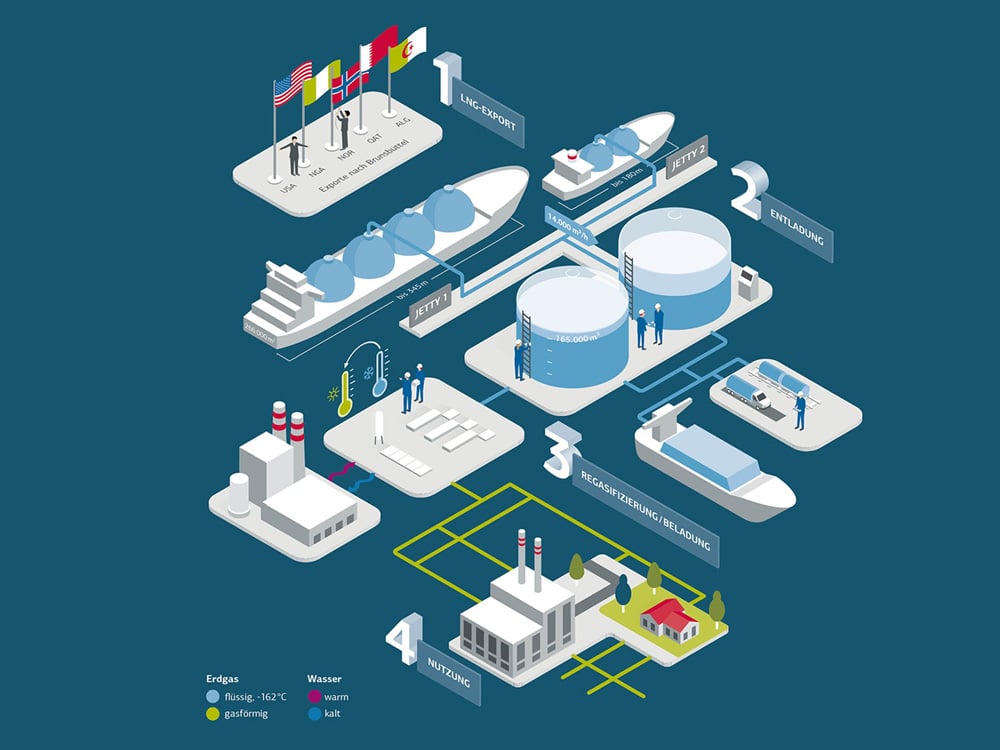
It’s now become apparent to most market observers that the energy supply in Germany and Europe is going to fundamentally change. Instead of fossil fuels it’ll be up to renewable energy sources to keep the economy and society moving.
Given what we know today, hydrogen will be paramount to this transformation process since there’s no way of linking up the various parts of the energy ecosystem without recourse to hydrogen gas.
The underlying conditions that make this possible have already been put in place: Both the German government and the European Parliament have made clear their support for a hydrogen economy. For months now, other national hydrogen strategies have been popping up around the world – surely evidence that the hydrogen industry will be on a global scale. The announcement of the Inflation Reduction Act by the Biden administration in the US made it abundantly clear, if it wasn’t already, that hydrogen is the fuel of the future.
Despite current developments speaking for themselves, many industry players are still hesitant when it comes to making concrete investment commitments. And at the numerous trade fairs and congresses in the fall, the overwhelming majority of attendees were heard grumbling about the government, complaining that it hadn’t created suitable safety nets.
High-ranking company execs are calling for more regulation on this and that. Sometimes the criticism is directed at the approvals procedures, other times it’s EU legislation or local stipulations. The reasons given as to why a decision can’t be made right now are many and varied, but most of them are used as excuses for doing nothing.
Yet all those who are just talking while sitting on their hands, need to ask themselves what they are really waiting for. For state guarantees that ensure the maximizing of profits whatever happens? For binding assurances that safeguard the company’s survival for the next 20 years?
At the H2Expo in Hamburg, for example, one manufacturer of stationary hydrogen engines said: “We can bring out 1 gigawatt, but there isn’t the demand.” Elsewhere a representative from the gas industry boasted: “Hydrogen could flow through our pipes if it were there.”
Needless to say, we still don’t have sufficiently affordable green hydrogen yet, which explains why hydrogen engines, for want of a viable business model, are still not in demand and pipelines continue to carry only fossil gas.
And yes, the electricity market does need overhauling to create more planning certainty. And the shortage in chips and skilled personnel does need addressing. But this reputedly unclear legal situation and the lack of renewables capacity mustn’t be used as justification for failing to act right now.
If some people really want to wait for others to solve the challenges we are facing, then they are welcome to do so. Whoever holds off until all issues have been settled between natural gas and hydrogen network operators and the chips are pouring in again, will have months, if not years, to twiddle their thumbs. However, the cake may well have been polished off by then.
Of course, much work still has to be done at a policy and regulatory level – and quickly. The impact that policy can have is now plain to see. Emissions limits or other environmental rules have been introduced in every imaginable branch of industry, be it for the automotive sector, for cement producers or for wind farm operators – and successfully so. The latter are required to reduce their own energy consumption annually by 5 percent (see p. 44).
There are times when the government is able to act relatively quickly if it wants or needs to – something we can see at the moment with LNG terminals on the German coast. But what’s the point of having ostensibly hydrogen-ready terminals if they don’t get any green hydrogen because those with the cash and the know-how don’t get their act together, don’t get involved in renewables expansion or building up production capacities for electrolyzers, fuel cells or hydrogen engines?
You’ll often hear people citing a “new German swiftness,” but this is usually when asking others to move at a faster pace rather than to gauge their own actions. It’s fascinating to listen to large companies and corporate groups in particular gladly pointing the finger of blame at politicians and demanding they set up “appropriate framework conditions” without themselves putting in the prep work.
So here’s a heads-up: Anyone who genuinely believes that, in times like these, they can palm off all risk to the German government or the taxpayer, is in very real danger of becoming a bystander. Those who avoid taking responsibility today for their own company and/or employees, could soon bitterly regret their lack of action.
And that would be a crying shame because – after 50 years of delays and disputes – we can’t afford to waste any more time in bringing about social and environmental change and meeting our climate goals so that ultimately the planet can remain a habitable place.







